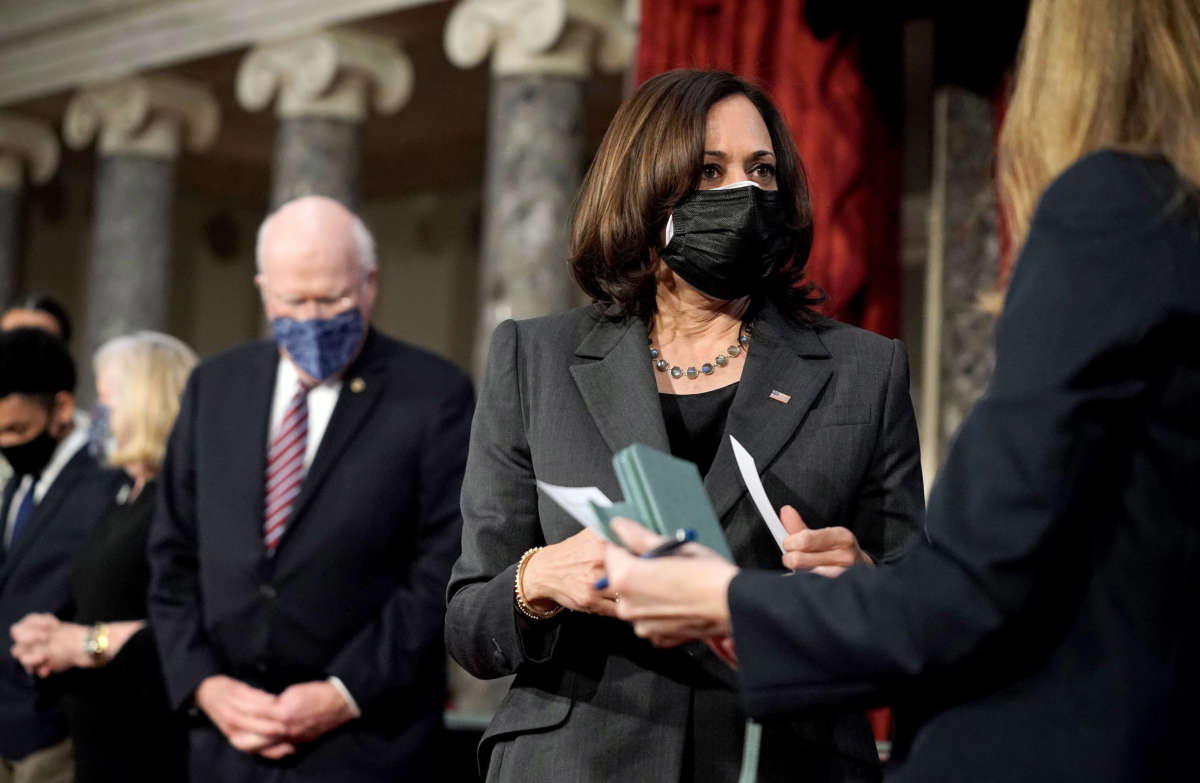The Senate passed a budget resolution Friday morning that will allow for the passage of President Joe Biden’s $1.9 trillion stimulus package with a simple majority vote.
At around 5:30 am, the resolution passed 51 to 50 along party lines with Vice President Kamala Harris casting the tiebreaking vote. The vote unlocked reconciliation, which will allow the Democrats to bypass the filibuster in the Senate and cast a similar party-line vote to eventually pass the stimulus. This came after an all-night amendment-passing marathon known as “vote-a-rama” that started on Thursday afternoon.
The bill serves as an authorization for the $1.9 trillion stimulus package and it gives instructions to the committees that will now draft the legislation on writing it under reconciliation. It now bounces back to the House, which already approved it, so that the chamber can approve the amendments that were passed. The House could vote on it as early as today.
Several senators expressed their displeasure over the Senate having to hold a “vote-a-rama,” which is part of the budget process that allows lawmakers to bring an unlimited number of amendments and potentially force a vote on. Sen. Brian Schatz (D-Hawaii) called it “the worst part of the United States Senate.” Sen. Sheldon Whitehouse (D-Rhode Island) filed an amendment to end all “vote-a-ramas,” but it did not get a vote.
The process — typically used by the minority party to generate annoyance and allowed by rules that some call “arcane” — eats up time and forces votes that could potentially trip up tired, sleep-deprived lawmakers and come to haunt them come election season. This is especially true since none of the amendments are binding. As of Thursday night, over 800 amendments had been filed.
One such amendment that appeared to be engineered to trip lawmakers up was brought by Sen. Joni Ernst (R-Iowa) whose proposal was to ban the $15 minimum wage during the pandemic — which Sen. Bernie Sanders (I-Vermont) agreed with, pointing out that the minimum wage proposal in the stimulus package raises the wage incrementally over five years. He emphasized that the minimum wage increase was vital to the bill and said “we need to end the crisis of starvation wages.” The Senate adopted the amendment by voice.
Senators Joe Manchin (D-West Virginia) and Susan Collins (R-Maine) introduced an amendment to block the $1,400 relief checks from going to “upper-income taxpayers,” a currently undefined group, that passed 99 to 1. However, in the bill’s current form, the checks are already not going to people with a reported income of over $75,000.
Senators Tom Cotton (R-Arkansas) and Todd Young (R-Indiana) brought an amendment to bar undocumented immigrants from receiving relief checks. The group is already barred from getting them because they don’t have social security numbers, but some Democrats warned that the amendment language could be interpreted to block undocumented immigrants’ children who are citizens from receiving the checks. The amendment passed with eight Democrats voting in favor.
Many of the amendments that the senators voted on were largely symbolic, and many had little to do with the stimulus itself. Democrats blocked a number of these: a proposal by Sen. Roy Blunt (R-Missouri) to bar federal funding to schools that don’t reopen once teachers are vaccinated and another by Sen. Patrick Toomey (R-Pennsylvania) to make state and local jurisdictions cooperate with federal law enforcement.
One amendment, however, to overturn Biden’s barring of the Keystone XL pipeline passed with Democrats Manchin and Sen. Jon Tester (D-Montana) voting in favor. The vote is symbolic but was designed to put Democrats on the record on the pipeline.
Biden and Harris are expected to meet with House Democrats on Friday morning to discuss next steps on the stimulus package.
Currently, the status of who will receive the $1,400 relief checks appears to be in flux. Currently, the checks are slated to go to individuals making less than $75,000 a year and couples making less than $150,000 a year. Democrats are discussing ratcheting that down to as far as the Republicans’ proposal of $50,000 for individuals and $100,000 for couples.
Press freedom is under attack
As Trump cracks down on political speech, independent media is increasingly necessary.
Truthout produces reporting you won’t see in the mainstream: journalism from the frontlines of global conflict, interviews with grassroots movement leaders, high-quality legal analysis and more.
Our work is possible thanks to reader support. Help Truthout catalyze change and social justice — make a tax-deductible monthly or one-time donation today.
